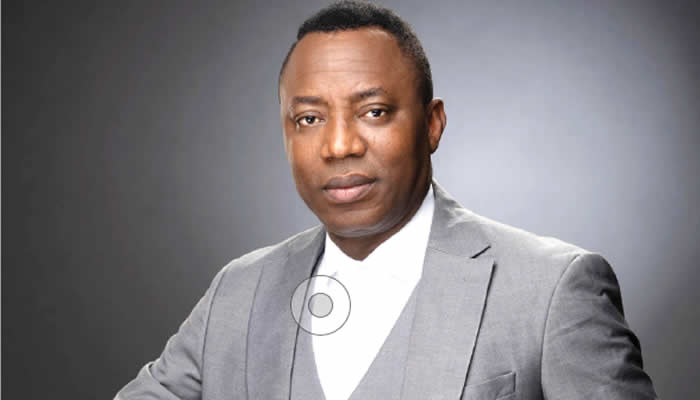 Socio-Economic Rights and Accountability Project and Amnesty International Nigeria have asked President Bola Tinubu to order the withdrawal of criminal charges filed against activist Omoyele Sowore, as well as the social media platforms X (formerly Twitter) and Facebook, over alleged anti-Tinubu posts.
Socio-Economic Rights and Accountability Project and Amnesty International Nigeria have asked President Bola Tinubu to order the withdrawal of criminal charges filed against activist Omoyele Sowore, as well as the social media platforms X (formerly Twitter) and Facebook, over alleged anti-Tinubu posts.
The groups, in a joint letter dated September 20, 2025, and signed by SERAP deputy director, Kolawole Oluwadare, and Amnesty International Nigeria director, Isa Sanusi, also urged Tinubu to stop the Department of State Services and other security agencies from “misusing judicial processes to silence dissent.”
They further called on the President to direct Attorney General of the Federation, Lateef Fagbemi (SAN), to propose an anti-SLAPP law before the National Assembly, to prevent the use of lawsuits to stifle public criticism.
“The weaponisation of the justice system to crack down on peaceful dissent is entirely inconsistent with the Nigerian Constitution 1999 (as amended) and the country’s international human rights obligations,” the letter read in part.
According to the groups, two of the counts against Sowore were brought under the Cybercrimes (Amendment) Act 2024, while three others, criminal defamation, causing public fear and disturbance, were filed under the Criminal Code Act.
The charges, lodged at the Federal High Court in Abuja on September 16, followed Sowore’s alleged refusal to delete posts critical of Tinubu.
They warned that “SLAPP and criminal defamation lawsuits are neither necessary nor proportionate” and create a chilling effect that discourages free expression.
“A lawsuit challenging the legality of the Cybercrime Act 2024 is already pending before the ECOWAS Court.
“The DSS and other agencies cannot and should not use the amended Act to silence peaceful dissent pending the hearing and determination of the case,” the groups stated.
They also cautioned that, “The use of SLAPP and criminal defamation lawsuits by security and law enforcement agencies with the purpose of silencing criticism is a threat to freedom of expression. SLAPP lawsuits pose serious risks to democracy and the rule of law as they limit public participation.”
The organisations reminded Tinubu of his own Democracy Day speech in June, where he said, “We dare not seek silence because the imposed silence of repressed voices breeds chaos and ill will… Call me names, call me whatever you will, and I will still call upon democracy to defend your right to do so.”
The letter recalled that DSS in May 2025 also filed a SLAPP lawsuit against Professor Pat Utomi, a former presidential candidate, accusing him of attempting to illegally usurp Tinubu’s executive powers by setting up a shadow government.
In the suit marked FHC/ABJ/CS/937/2025, filed at the Federal High Court in Abuja, the DSS alleged that Utomi’s actions posed a threat to national security and constitutional order.
Similarly, DSS operatives in October 2024 filed a SLAPP lawsuit against SERAP over allegations of an unauthorised office invasion.
“These cases illustrate the growing use of SLAPP lawsuits by the DSS and other security and law enforcement agencies in Nigeria to target, harass and intimidate Nigerians for the peaceful exercise of their human rights,” the groups said.
The groups gave Tinubu seven days to act, warning that failure to withdraw the charges would force them to pursue “all appropriate legal actions, including before the ECOWAS Court of Justice.”
